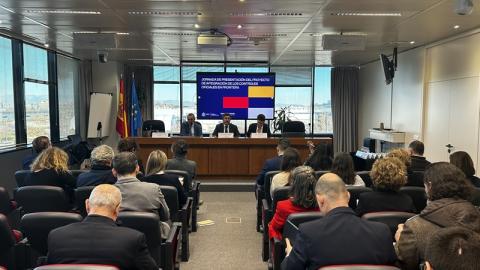
Launch of the new border control services model for goods
• Puertos del Estado hosts a presentation day with the Ministries of Agriculture and Territorial Policy to introduce new PCF controls, which will begin in all ports starting the week of January 20.
January 15, 2025 (Puertos del Estado). The Ministries of Agriculture, Fisheries, and Food, and Territorial Policy and Democratic Memory, in collaboration with the Ministry of Transport and Sustainable Mobility through Puertos del Estado, today presented at the public agency’s headquarters the new border control model for goods. This model will be implemented across all Border Inspection Points (PCFs) starting January 23. This initiative is part of the joint effort to enhance health and phytosanitary inspection services at borders, following the event held in July 2024 at the Port of Algeciras and the highly positive results of pilot projects launched since October 2024 in Algeciras and Barcelona.
The new model, outlined in Order PJC/756/2024 of July 22, aligns the control system with those of neighboring countries and leverages synergies and benefits derived from digitalization to share resources and modernize management with standardized procedures. The pilot projects have demonstrated that this unified border inspection system improves the efficiency of food controls while maintaining the essential quality standards in such a critical area as human nutrition.
Álvaro Rodríguez Dapena, President of Puertos del Estado, emphasized “the importance of digitalization and the implementation of coordinated systems to enhance the efficiency of the state-owned port system, benefiting operators, managers, and ultimately, society.” Similarly, Myriam Álvarez Paez, Secretary-General for Territorial Coordination, highlighted that “this new border goods control model is the result of intensive work developed over recent years by the competent ministries to improve the service provided to economic operators.” She also stated, “Today, we see with satisfaction its positive results in terms of efficiency and effectiveness, confirming that this is the path forward to ensure service delivery meets current needs in international goods traffic. This will undoubtedly yield significant improvements in the competitiveness of our ports, moving beyond delays that have previously undermined the competitiveness of our foreign trade.”
Valentín Almansa de Lara, Director-General for Health in Agricultural Production and Animal Welfare, stressed that “the integration of official border control services is a government priority reflected in Order PJC 756/2024.” He added, “The Ministry of Agriculture, Fisheries, and Food recognizes the economic importance of the agri-food sector, with export values of €75 billion, and that the system of official controls must account for this economic dimension.” Additionally, he emphasized that this integration of official border controls represents a change in the model that will enhance the functioning of foreign trade, establishing more effective and efficient—but not less rigorous—controls. “In summary, it is not about controlling more or less but controlling better,” he concluded.

